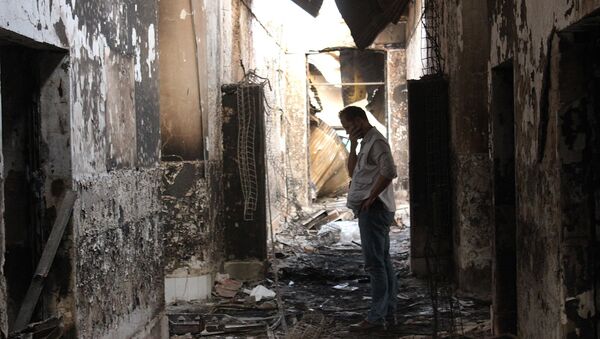The aerial attack by a US gunship on October 3, 2015 unleashed over 200 shells on the hospital, killing 14 MSF aid workers, 24 patients and four of their caretakers.
One year on, hospitals continue to be "dragged onto the battlefield," MSF Director General Christopher Stokes warned. The medical charity estimates that 77 attacks have been launched at the facilities it runs in Syria and Yemen since last October.
"A war without limits leads to a battlefield without doctors. We will not sit silently by and let this happen," Stokes wrote in an article on the MSF website, commemorating the Kunduz hospital bombing.
As it happened
According to MSF data, an AC-130 gunship attacked the Kunduz Trauma Center after ground troops fighting Taliban insurgency in Kunduz claimed that all civilians had left the city. No effort was made to confirm this, Stokes wrote.
The entire city was therefore deemed hostile, allowing US forces in Kunduz to invoke self-defense rules and mount a "shoot first, ask questions later" military operation against the Taliban.
The bombing continued for half an hour. Just minutes into the attack, MSF staff reportedly called US officials and pleaded them to stop, but it took some 20 minutes before fire ceased.
The overnight attack killed dozens in their sleep and left the 92-bed facility in ruins, destroying the only hospital that provided free surgical care to trauma victims in the whole northeastern region of Afghanistan.
Investigation & UN response
MSF immediately demanded that the Kunduz bombing be investigated by an independent international body as a war crime, arguing Washington knew about the clinic’s location prior to the attack.
Despite this, the Pentagon conducted an internal military probe and issued a heavily redacted report last April that described the airstrikes as a combination of human errors and technical failures.
The deadly attack on the Kunduz medical center and a rise in assaults on MSF-supported clinics in Syria and Yemen led to the UN Security Council passing a resolution in May 2016 that condemned targeting healthcare facilities and demanded accountability from warring parties.
Speaking at the UNSC last Wednesday, MSF’s International President Joanne Liu called attacks on hospitals a red line and complained that nothing had changed since the adoption of Resolution 2286.
"Many attacks are brushed off as mistakes, committed in the fog of war. We reject the word ‘mistake’," she announced, demanding that UNSC members live up to their obligations to protect doctors and patients in war zones.
Recent attacks
In the past year, an increasing number of medical facilities have become targets of attacks in war-torn regions across the Middle East and North Africa.
On April 28, 2015, the al-Quds hospital in Aleppo, supported by the MSF, was attacked with an airstrike, which directly hit the building, killing at least 50 people.
On August 15, a Saudi-led coalition's airstrike partially destroyed a hospital in Yemen's Hajjah, run by the MSF, killing 14 people. It was the fourth attack on a hospital supported by the charity organization in 10 months.
Most recently, the bombing of the Syrian city of Aleppo late on Tuesday damaged two MSF-backed hospitals, killed 2 patients and injured two medical staff members.
Following the attack, the MSF urged the UN Security Council to take action to protect medical facilities in Syria.







